Published Aug 24, 2020
An Enterprising Voyage with Robert Pine
Turns out Star Trek runs in the family.
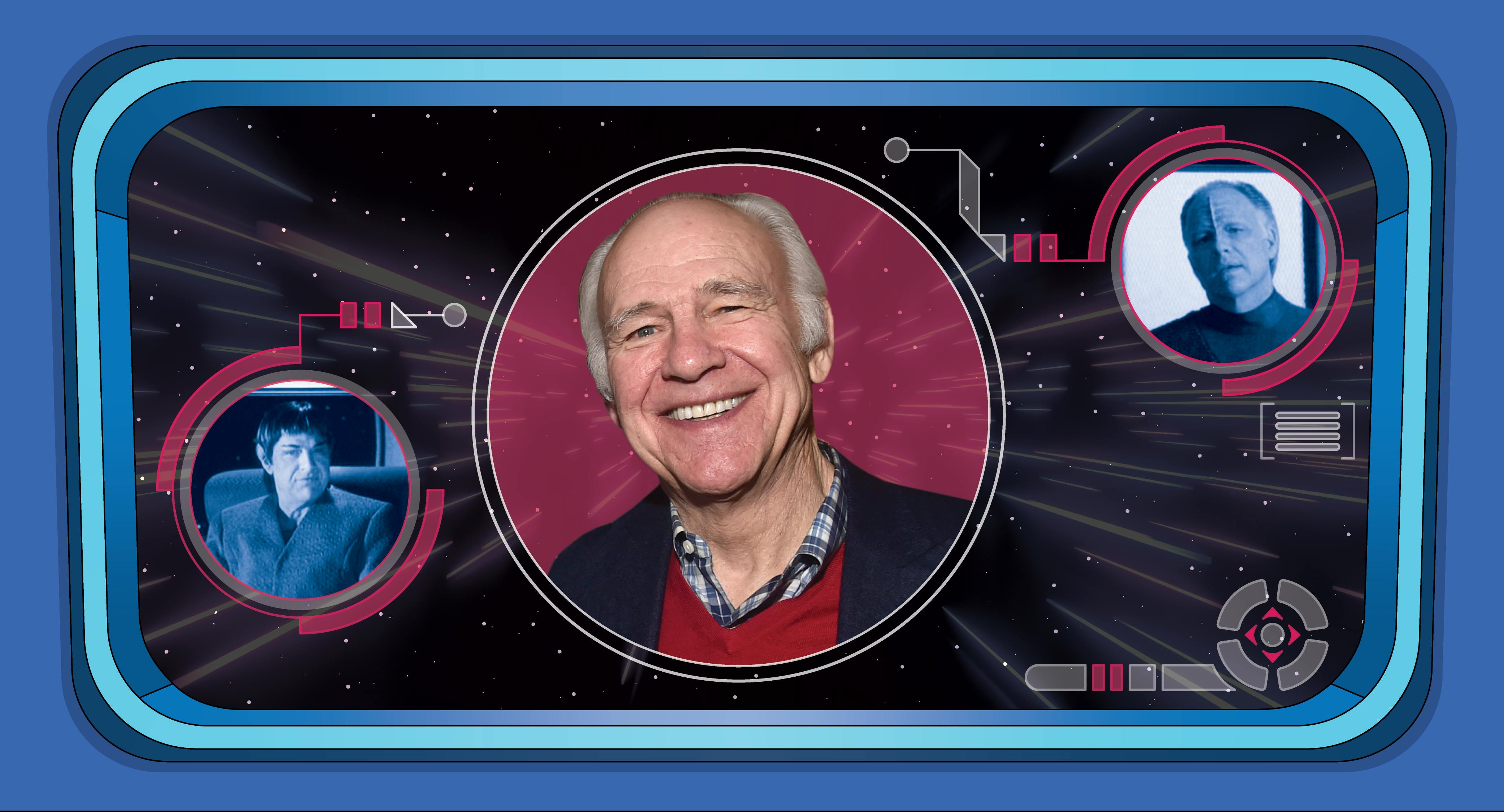
StarTrek.com
A world-renowned actor whose illustrious career is defined by his starring role as Sergeant Joseph Getraer on CHiPs, Robert Pine also counts two Star Trek guest appearances among his many television and film credits. Star Trek: Voyager’s “The Chute” found Pine portraying the Akritirian Ambassador Liria, an alien official who sparred with Captain Janeway over her wrongfully imprisoned crewmembers Tom Paris and Harry Kim. Star Trek: Enterprise’s “Fusion” saw Pine play the Vulcan Captain Tavin, the congenial leader of a sect known as V'tosh ka'tur (Vulcans without logic). Of course, Pine’s son, Chris, is well-known to Star Trek fans as Captain James T. Kirk in Star Trek (2009), Star Trek Into Darkness, and Star Trek Beyond.
StarTrek.com spoke with Pine about his start in Hollywood, his two Star Trek roles, his reaction to his son becoming Captain Kirk, and other memories from his fascinating career.
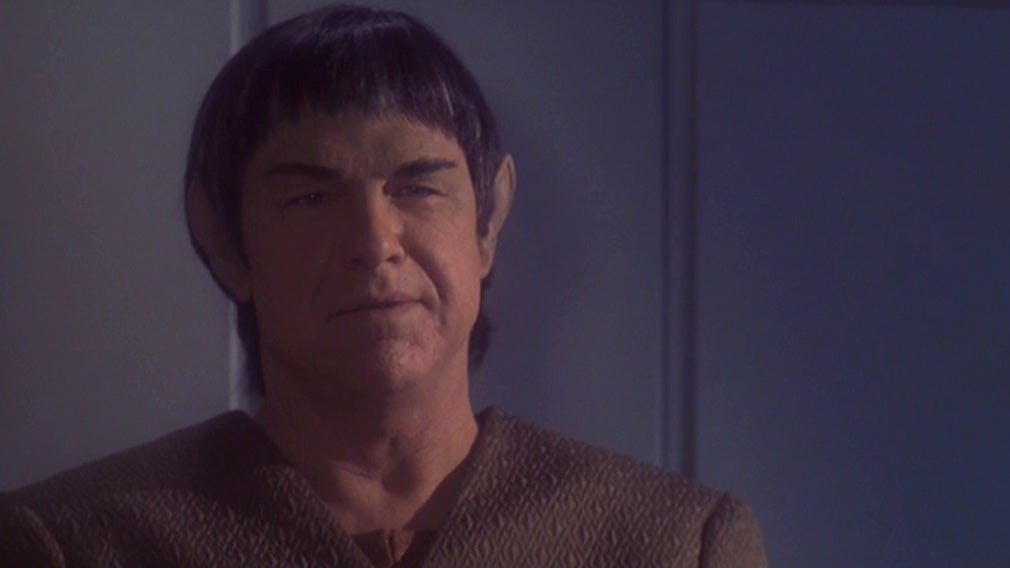
StarTrek.com
StarTrek.com: Your impressive film and television career began to take shape around the same time as Star Trek: The Original Series initially aired. What was it like coming up in Hollywood at that time, and did you ever watch Star Trek in those early years?
Robert Pine: You know, I didn’t. Which surprises me, because we only had three networks back then (laughs). I mean, I may have watched it once or twice, but I usually watched shows that I might have a chance to do. I was doing lots of westerns when I first started, and one of the first things I did when I got out to Hollywood in 1964 was to learn how to ride a horse. It was the smartest thing I ever did, because I became a good horseman. I actually really enjoyed it. So I didn’t watch Star Trek all that much. I hate to admit that, especially since my family is enjoying the benefits of being in Star Trek. Not necessarily myself, but definitely my son Chris.
From 1964 to 1967, I was under contract to Universal Studios, and Star Trek wasn’t a Universal show. The chances of me getting a role in it or anything like that were pretty slim. When I first started, I had no background at all in movies, television, or on the stage. My contract work was the first job I ever got, and that lasted three years. Universal would loan you out to other studios for more money than they were paying you, so there was no reason for Star Trek to hire me when they could hire somebody who wasn’t under contract. There were thousands of young people around Hollywood who fit my description (laughs), so that was the competition I had.
You appeared on many popular shows in the 1960s, did you ever audition for a role on The Original Series?
RP: No, I never did. At that time, they would never have sent out a casting call that would include me. As a contract player, I had a very good agent at the time, but I had a job and, with my lack of experience, the agent wasn’t going to put much energy in finding me work at other studios, and it was up to him to go out and drum up business outside of Universal. Even if, for some reason, my agent brought up my name for a role with the Star Trek casting people, as soon as they heard that I was a contract player at Universal, that would end the conversation. I’m sure the network, CBS I believe, who always had cast approval, would not want to hire a Universal contract player, make him more valuable, and then see him get in another show that’s going to go up against theirs. I never worked outside of Universal during my contract, I was learning about the business at the time. I was a very green rookie.
You starred on the hit series CHiPs, which also featured Star Trek fan-favorite Michael Dorn in one of his earliest roles.
RP: Michael is a wonderful guy, we all loved him. Wouldn’t you know, he became more successful than any of us after CHiPs ended. He made a ton of dough, I’m sure. We used to play tennis, and he’d drive up in his Ferrari [laughs]. Michael even had his own plane. I love Michael, I couldn’t be happier for him that he’s been so successful. He’s just a real solid guy, I can’t say enough good things about him.
In Star Trek: Voyager’s “The Chute,” you guest starred as an adversarial Akritirian. What was it like to land and prepare for your first Star Trek role?
RP: I had read for a number of Star Trek roles by that time, and the dialogue is very difficult for me. Within the last twenty-five years, I was diagnosed with attention deficit disorder. To focus can be difficult at times, and anything can take my mind away. I went in to read for some of those Star Trek parts, and they’d have all of this technical jargon. I’d think, Holy smokes, this isn’t going to work. In the back of my mind, I’d secretly be hoping that I didn’t get the role, because I figured I’d probably sweat through the whole thing [laughs].
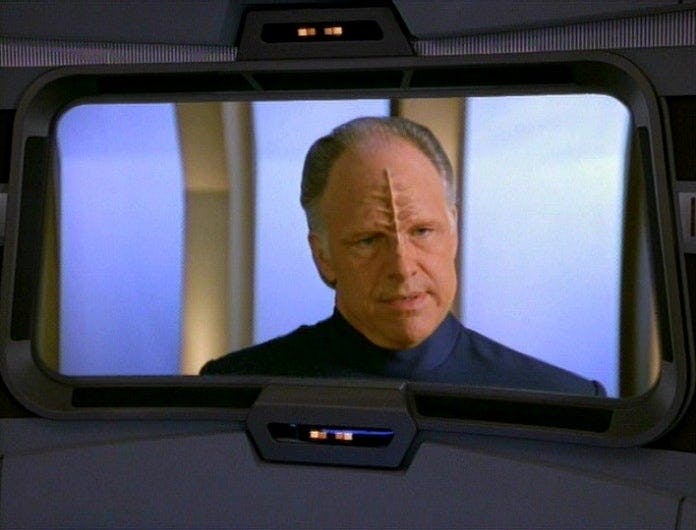
StarTrek.com
In terms of preparation for that episode [“The Chute”], I remember it was just one page of dialogue, so I wanted to learn that well. The character [Ambassador Liria] was a man in charge who had a certain attitude and a conflict with the crew. When you prepare for these parts, you need to find a particular action that fits the character and brings him to life. I also had a mask made of my face so they could put the alien appliance on my forehead. In the second episode [“Fusion”], they didn’t do that, they just gave me Vulcan ears. So I never really appeared as myself, although I was recognizable, unlike Mr. Dorn [laughs].
You know, I really do love the experience of acting under makeup. A couple of years ago, I was on the pilot of the new Charmed series. That part required a lot of makeup, and it was great fun. Ironically, after going through the whole process, I later found out they decided to change course and digitally depict my transformation into a monster. I was disappointed, because what they were able to do with the makeup was really cool. In terms of moviemaking, I love the green screen work and all of the other crafts that are involved in our business.
You appeared via Voyager’s viewscreen in “The Chute.” Did you have a chance to rehearse or collaborate with any of those show’s cast when you filmed those scenes?
RP: Not really. It’s so brief, you’re in your trailer and then you shoot the scene. I might have met a few people in the makeup room, but then you go on the set and shoot it. Of course, it’s an easy shot with maybe one or two angles and different close-ups. So you’re probably done within an hour, you say goodbye to everyone, and you’re gone [laughs]. It’s not very romantic, it’s mainly about getting the work done and leaving.
On the other hand, you took on a bit of a larger role as the Vulcan Tavin in Star Trek: Enterprise’s “Fusion.” Did you do any research about Vulcans for that guest spot?
RP: Well, I knew that their emotions were very controlled. I didn’t watch Star Trek as a habit, but I’d seen the movies and knew about the characters at that point. I used that knowledge as my baseline for that role. I enjoyed it quite a lot. Speaking of my ADD, I remember screwing up a very easy line over and over again on my first day. I thought, Oh God, these people must hate me!. On the contrary, working with Scott Bakula was great, he was a very nice guy and incredibly patient. I’ve always enjoyed his work.
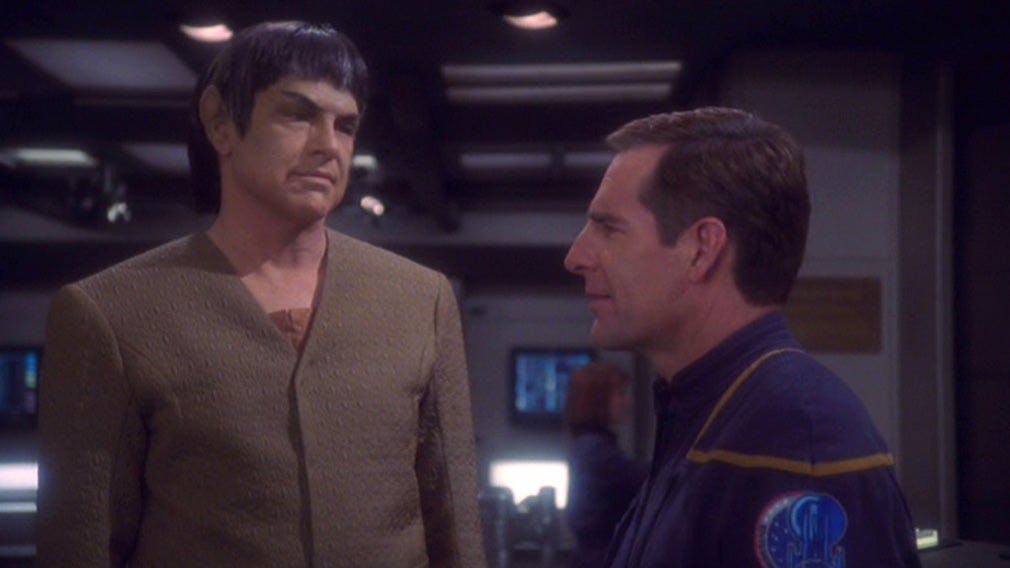
StarTrek.com
How did you react when you learned that your son Chris landed the role of James T. Kirk in J.J. Abrams’s Star Trek (2009)?
RP: Oh, I was delighted for him. Chris is such a hard worker, and I’m so proud of him. I’ll run into people who have worked with him and they’ll tell me how he’s such a team player. You know, I think it’s more fun watching him succeed than it would have been for me to have a bigger career. He puts in the time when it comes to preparing for a role, and he’s very smart. I was thrilled when he got that part, because I knew it would push him to another level in his career.
I mean, look… I’m his father. I’m his biggest fan. I love the way he’s handling everything. He’s daring in the roles he takes, and he has a very broad range that he can cover. I think people have yet to truly see the extent of his talent.
Did you offer him any advice at the time he was cast in Star Trek?
RP: We’ve talked, as actors do at times. The best thing I can do for my son is support him and be his number one fan. In the end, you can hear all the advice in the world, but you’ve got to do the job. He knew that right out of the gate and has made his own way. Some people might believe that he had a father who got him started, but that’s not correct. Now, he grew up around actors, so that’s all he knew. That gives a person a leg up in this business. For the first twenty-five years or so of my career, I was looking over my shoulder for the talent police to throw me out of Hollywood [laughs]. Luckily, he didn’t have that burden.
Chris has incredible commitment. When he has an idea of what he is going to do, he goes in 110 percent. He decided to try out for a play as a freshman at Berkeley [University of California, Berkeley]. He didn’t want to join a fraternity, but he wanted a group of people to hang out with. Chris did plays throughout college, and I couldn’t keep my eyes off of him. He fills the stage. He’s not just saying his lines and waiting for a cue. I admire him greatly, he is such a more complete actor than I could have ever dreamed of being. He’s the real deal, as far as I’m concerned. He’s going to be forty this August, and he’s matured into a wonderful, concerned, and intelligent human being. For a parent, it’s the greatest thing you can see.
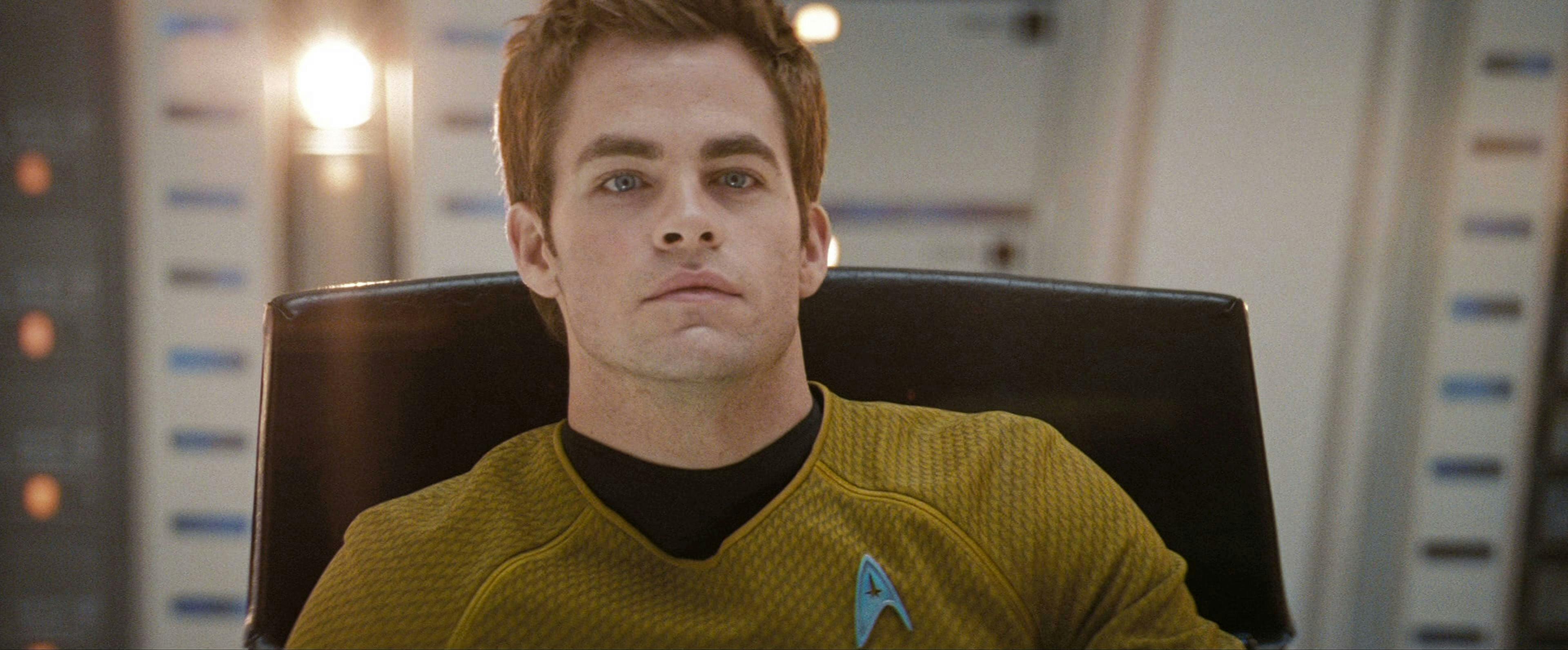
StarTrek.com
Your son quickly endeared himself to Star Trek fans with his big-screen appearances as Captain Kirk. Has your impression of the franchise changed now that you each have a place in Star Trek lore?
RP: Yes, I wasn’t as aware of the impact that the show has had on its fans. Now I see the deep message that Gene Roddenberry initially embedded in it. Star Trek is the thinking person’s sci-fi, as opposed to Star Wars. Not to take anything away from Star Wars, as I believe its ideas can be absorbed better by a younger audience and therefore a wider appeal. This is only me talking, but I keep wondering why there hasn’t been another new Star Trek movie. I’m a little disappointed at J.J. Abrams, because he went over to Star Wars and took his energy with him.
I do hope they do another Star Trek movie, and I love that Quentin Tarantino says he wants to do one. I’d love to see what that would look like. I don’t know where things stand on that, but I know Tarantino is a great filmmaker and, from what I read, he thinks Chris is a terrific actor. They and the rest of the talented Star Trek crew might just make some beautiful music together. I must add that these are my opinions, not Chris’s. He is a very articulate man and speaks very well for himself.
COVID-19 has interrupted our daily lives, but could you tell us about what you were up to prior to the current era of self-isolation?
RP: In January, I did a comedy called Fourth Grade with Billy Baldwin, Teri Polo, and Mena Suvari. It’s by a Brazilian director named Marcelo Galvão, and it should be quite amusing. I haven’t seen the whole thing yet, but I think it should be fun. Hopefully, I’m also going to be doing a picture called Sonny at the end of August. Nell Teare will be writing, directing, and starring in it. I’m really looking forward to filming that one, because Nell is very sharp and I like the relationships she’s built into the movie. That’s really as much as I can tell you about it at the moment [laughs].
Jay Stobie (he/him) is a freelance writer who contributes articles to the official Star Trek website and Star Trek Magazine, as well as to Star Wars Insider and the official Star Wars website. Jay also serves as a part-time assistant and consultant advising many actors and creatives who work on his favorite sci-fi shows and films. He can be found on Twitter and Instagram at @StobiesGalaxy.

